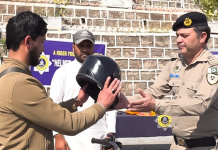As the Pakistan Tehreek-e-Insaf’s (PTI) “Jail Bharo Tehreek (court arrest movement)” kicked off Wednesday, PTI senior leaders Shah Mahmood Qureshi, Asad Umar, and Azam Swati, along with party workers voluntarily surrendered themselves to the Lahore police.
The movement, according to PTI rationale, aims to counter the “attack on constitutionally-guaranteed fundamental rights” and the “economic meltdown” by the incumbent government”.
As the crowd grew more sizable, police barred everyone, including officials, from entering the Capital City Police Office (CCPO) — where the party had gathered.
Many of the party’s senior leaders — including Qureshi, Umar, and Swati — and activists boarded a prison van, with several workers also climbing onto the roof of the van.
Local police later clarified that these arrests were entirely voluntary, “we did not arrest them, they have come and sat in the prison van of their own discretion.”
Other PTI leaders who climbed onto the police vehicle include former Punjab governor Omar Sarfaraz Cheema.
Several PTI workers, including women, were also present outside the CCPO building and many lay on the road, demanding that they be arrested.
The PTI workers then got down from the police van and made their way toward Charing Cross.
‘Peaceful, non-violent protest’
PTI Chairman Imran Khan — in the wake of sedition cases filed against his party leaders including Fawad Chaudhry, Swati and Shahbaz Gill — had announced the movement on February 4.
In the first phase of the movement, the party’s senior leaders — Qureshi and Umar — had planned Tuesday to voluntarily surrender themselves to the authorities.
Taking to Twitter, former prime minister and PTI chief said today that the party “is set to start” the Jail Bharo campaign for two main reasons.
“One, it is a peaceful, non-violent protest against the attack on our constitutionally-guaranteed fundamental rights. We are facing sham FIRs and NAB cases, custodial torture, attacks on journalists and social media people,” wrote the PTI chief.
Khan went on to say that the second is against the economic meltdown brought on by a “cabal of crooks who have money laundered billions in looted wealth and gotten NROs for themselves while crushing the people, especially, the poor and the middle class, under the burden of spiralling inflation and rising unemployment.” To invigorate party workers for the movement, Khan also released a video message urging them to “fill up prisons and shatter the idols of fear”.
He called on all Pakistanis to join the movement to achieve “Haqeeqi Azadi” (true freedom).
Govt to scrutinise arrested workers
The provincial government has decided that the criminal histories, and tax and bank records of people arrested under the PTI’s court arrest drive will be thoroughly scrutinised.
“If anyone is found involved in corruption or criminal cases, immediate action will be taken against them,” sources privy to the Punjab government said.
The sources added that all law enforcement agencies have been mobilised in the run-up to the PTI’s movement, adding that since jails in the provincial capital are brimming to capacity, the arrested individuals would have to be sent to jails in other cities like Mianwali and DG Khan.
In a meeting chaired by Interior Minister Rana Sanaullah, it was also decided that women and poor workers would not be detained during the PTI movement.
Movement aimed at creating ‘political instability’
Earlier, Sanaullah had said that the PTI’s court arrest drive was aimed at creating political instability, and a law and order situation in the country.
Chairing a meeting on law and order, he had said the PTI wanted to get media attention by creating drama.
“The miscreants should be exposed by presenting evidence of their wrongdoings before the masses,” he had added.
In the meeting, it was decided that the “miscreants” would be arrested and law and order would be ensured in the country at all costs.
Moreover, records of those arrested will be maintained and their activities will be mentioned in their character certificates.

















